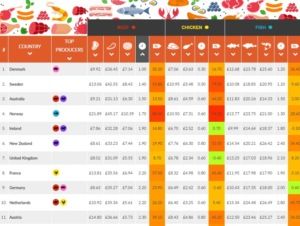News
Danish News in Brief: Danes can best afford meat
This article is more than 7 years old.
Elsewhere, a high-ranking PKK member is arrested in Denmark and Jannik Vestergaard becomes Denmark’s most expensive transfer in history

Meat is just more affordable for low earners in Denmark (photo: Caterwings)
According to the latest Meat Price Index, published by the online catering firm Caterwings, Danes on minimum wage can more easily afford meat products than their counterparts in other countries.
The index (here in English) showed that Danes on minimum wage need to work the fewest hours to be able to afford a kilo of beef, chicken, pork or lamb. And only the Swedes have to work less to be able to afford to purchase a kilo of fish.
Danes on minimum wage need only work one hour to be able to pay for one kilo of beef, 0.3 hours for a kg of chicken, 1.2 hours for a kg of fish, 0.7 hours for a kg of pork and one hour for a kg of lamb.
READ MORE: Danish experts: baby food in pouches can impact development
Meat munchers
The results also showed that the Danes were among the biggest meat consumers in the world per capita, ranking seventh – every Dane on average eating 95.2 kg of meat per year.
At the opposite end of the spectrum, India was the ‘leader’. A person on minimum wage in India needs to work over 30 hours to afford one kg of fish, pork or lamb, over 20 hours for beef and over 10 hours for chicken.
The index compares the minimum wage of 52 countries and compares the prices of 13 different meat products – such as mince meat, chicken breast, salmon, sausage, ham and lamb chops.
It’s important to underline that the index does not take in net earnings into account but rather only gross income.
Vestergaard sets the mark
Just a month after Thomas Delaney set the record for the biggest transfer in history involving a Danish footballer, a new record has been set. Jannik Vestergaard has set the new mark following a 186 million kroner transfer to Southampton from Bundesliga outfit Borussia Mönchengladbach. The towering defender will join countryman Pierre-Emile Højbjerg at the Saints, who narrowly avoided relegation from the Premier League last season. The 25-year-old left Brøndby for the Bundesliga at just 17 and played about 200 games for the likes of Hoffenheim, Werder Bremen and Mönchengladbach. He also has 16 caps for Denmark and was part of the Danish team that participated at the 2018 World Cup in Russia. Other big moves involving Danish players so far this summer include Daniel Wass shifting from Celta Vigo to Valencia and Riza Durmisi leaving Real Betis for Lazio.
Entry fee not an earner
Two years after the Danish government coerced the nation’s culture institutions to usher in entry fees due to austerity measures, the National Gallery of Denmark has revealed that the move has not led to any profit. The gallery revealed that it has not only failed to make a profit, but it has also lost a quarter of its visitors. According to its figures, its visitor numbers plummeted from 451,000 in 2015 to 334,000 last year. The museum said that it had expected the visitor numbers to drop based on similar experiences from the UK and Sweden.
PKK arrest in Denmark
A high-level member of the Kurdistan Workers’ Party (PKK) has been was arrested in Denmark on Friday, according to the state prosecutor. The 58-year-old Turkish citizen was arrested near Rødbyhavn after arriving from Germany. An international warrant for his arrest had been issued for him by Turkey and according to the Turkish media outlet Daily Sabah, the man is PKK’s co-ordinator in Scandinavia. Now it is up to the state prosecutor to ascertain whether there are grounds for him to be extradited to Turkey and until then he is being held in remand in Denmark until July 27. PKK is banned in Turkey and has been listed as a terror organisation in a number of other countries.
Zoo fencing out the foxes
Aalborg Zoo has been forced to invest millions of kroner on new fox-proof fences following the untimely demise of several of its inhabitants. Aside from a number of flamingos, peacocks and rhea birds being devoured by the crafty foxes, several other animals have been eaten. The zoo has tried to combat the problem using traps and locking up the animals during the night, but doing so is not optimal. The new fences are dug deeper into the ground and give electric shocks to foxes trying to climb over. The fence is expected to be completed by September 1, after which the zoo will round up the 4-8 foxes that have made their home in the zoo.










































